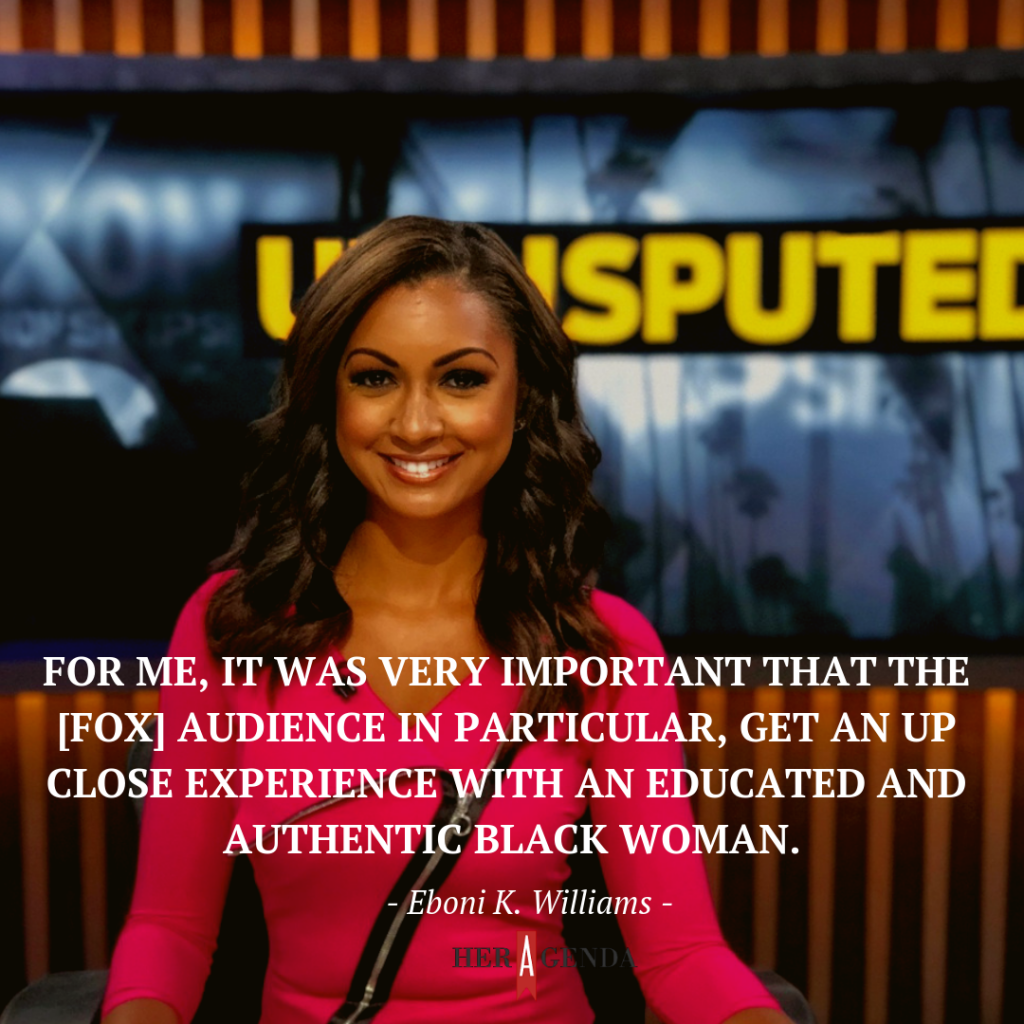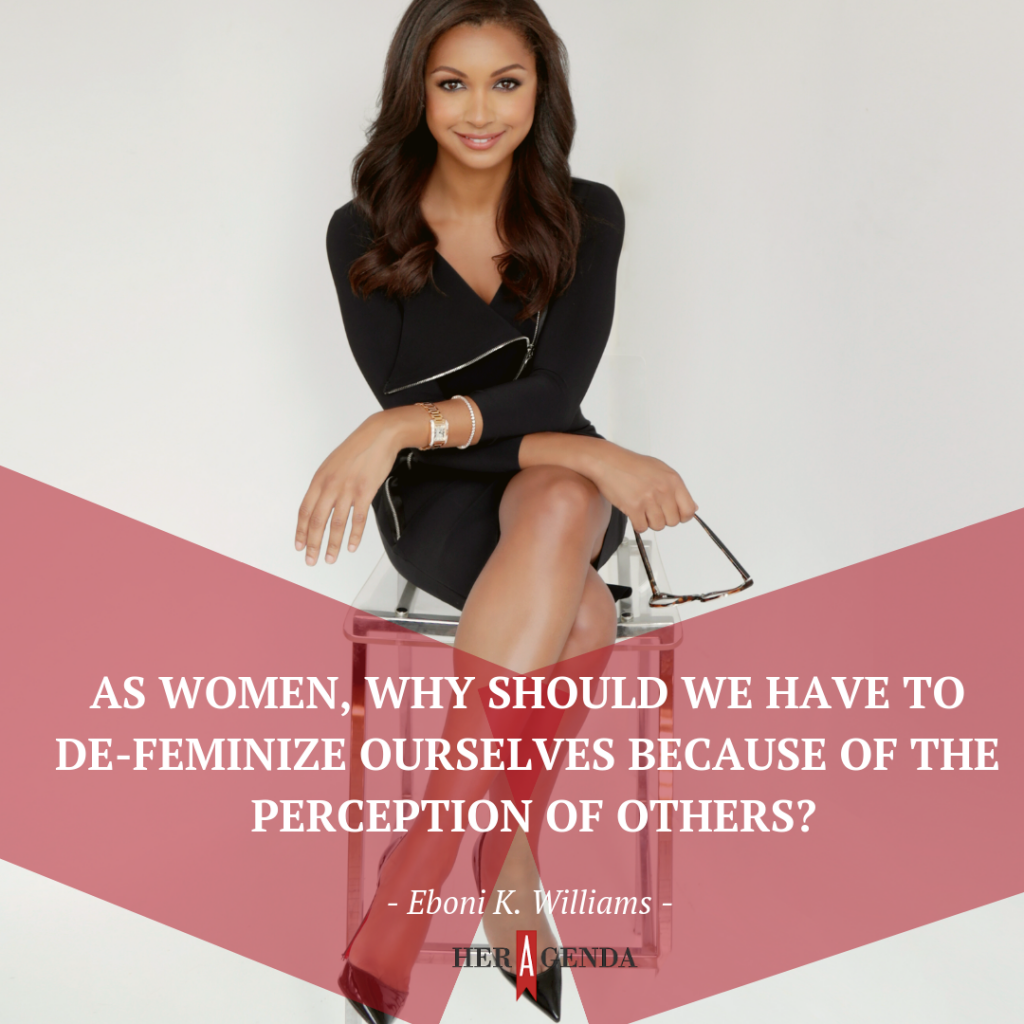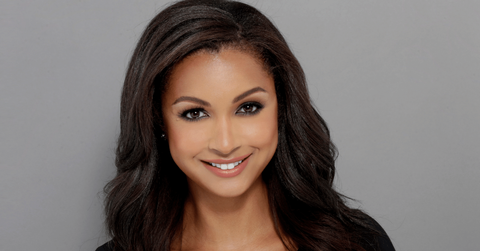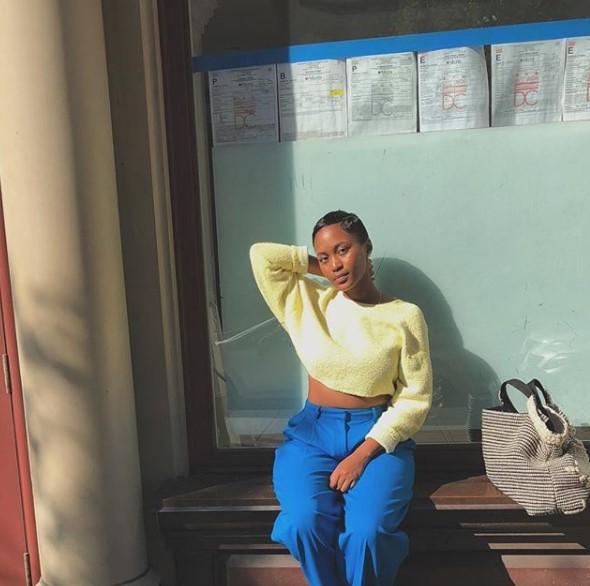-Treat yourself like a business.
Before taking the leap to pursue a career in media and later publishing, Eboni K. Williams was a practicing attorney in her home state of North Carolina; specializing in family law and civil litigation. Through these different career endeavors, her mission remained the same; to be a voice for the community and further the narrative that women of color can occupy any professional space. Williams—who came from humble beginnings and went on to attend Chapel Hill at 16 and finished law school at 23—has a story that follows the path of knowing your history, knowing who’s watching, and persisting.
In 2017, Williams became one of the few Black women to co-host an early-fringe show on Fox News. Fox News Specialists opened the door for her to appear daily on a major network and represent her community on a national level. Williams remained at the network long enough to address major social and political issues happening at the time (45, Charlottesville, voter suppression in Georgia, etc), before separating to use her voice in a different capacity.
She went on to publish, Pretty Powerful: Appearance, Substance, and Success, tackling a topic that many young professionals can relate to; showing up. In what she calls her love letter to Black women, Williams discusses the everyday struggle with balancing appearance and power in the corporate world.
Williams spoke to Her Agenda about her early career and transition to media, her tenure at Fox News, representation across high-level professional realms, life as a disruptor, and treating yourself as a business.

Her Agenda: Tell us a little about your early life and what led you into a career in law?
Eboni K. Williams: Where I grew up (Charlotte, NC), in the kind of poverty and environment that I grew up in, in terms of the way Black folks—Black women in particular—were treated, it was almost as if there was an expectancy of us to be in certain roles in society; particularly service industry roles. My Grandmother was a domestic [worker]. My Grandmother kept white folks children, cleaned their homes, and cooked for them. My mother felt that, although that was noble work, she wanted something different; she wanted something bigger. Those opportunities weren’t as available to her coming from the background she came from financially in Louisiana, so she moved the two of us to North Carolina.
While my mom wasn’t able to finish her formal education, she put herself through cosmetology school and started a path onto entrepreneurship. That was really important for her, and also for me because it showed me that she was rejecting the generational narrative that said, as a Black woman it is your place in society to work for other people. My mom said, ‘despite my economic background and my pedigree, if you will, I’m going to assert myself and work for myself.’ That was extremely powerful for me to see because it showed me a different narrative in terms of Black female empowerment.
Fast forward to my trajectory; going to Chapel Hill at 16 years old then going straight to law school at 20, coming out at 23 and practicing law. All of that was important because I really wanted to further change the narrative. I feel like my mom was a huge stepping stone in redefining the space for us as Black women professionally, and as an entrepreneur. She was first a cosmetologist and later went on to own a daycare; all female dominated spaces. Then, she totally disrupted the game, and started a trucking company where she was one of the only women. She owned 18-wheelers and worked with all men—mostly white men—and she bossed out in it. Again, I’m seeing this trajectory that says, it’s okay to be the first person to do what you’re doing in a space. That allowed me the opportunity to feel like I could be the first person to do what I wanted to do in a particular space.
-It’s okay to be the first person to do what you’re doing in a space.
Being a lawyer was really important because I wanted to help people and be a voice for the voiceless. Coming from a community where criminal justice was impacting my family and my community in harsh, horrendous, and devastating ways, I wanted to be a part of fixing that. Truth be told, I also wanted to be in a space that I didn’t see a lot of Black women occupying. Coming from a space where the Black people I saw were not doctors, lawyers, engineers, nurses, and higher education leaders, it was very important to me to change the narrative of what was available to us in terms of professions as Black women.

Her Agenda: Let’s shift the conversation to representation. We spoke about your mom, and how her direct influence led you down a lifelong path of breaking barriers. Present day, we’re seeing more discussion about the tremendous impact it has on young men and women to see people who look like them dominating their respective industries.
Eboni K. Williams: It’s very difficult to be what you do not see. Representation is one of the driving forces for what I do and the spaces in which I do it. That’s actually what led to my transfer from the courtroom to media and television. At that time, Barack Obama had just been elected and Michelle Obama was relatively new in the White House. Outside of marquee examples (Oprah Winfrey and Michelle Obama), most of the representation on television was in the reality TV space. This was pre Scandal, How to Get Away With Murder, Black-ish, Grown-ish; a lot of what we know today to be the preeminent Black examples in television.
-It’s very difficult to be what you do not see.
I grew up as an only child, so television has always been imperative in my development, comfort, and in many ways, how I felt represented. When I looked up and saw the [lack of] representation of Black women on television during that time, I didn’t like it. It didn’t reflect the Black women I knew. There’s a Theodore Roosevelt quote that says, basically, unless you’re in the arena, you can’t criticize. That’s how I felt. Unless I was going to be vulnerable and submit myself to the scrutiny and the work to be in that space, I had no room to criticize. It was then that I made the decision to walk away from law and pursue media. I love the law, but I felt that representation was more important for our children and the community.
Her Agenda: How did you get your start in media?
Eboni K. Williams: My start in media was on the radio, not television. I landed a gig on KFI 640, and I was giving legal commentary on big time cases. I eventually landed my first television hit with the O’Reilly Factor on Fox News, and that really started my television career. I went on to do CNN and HLN, giving a voice to the legal aspect of big cases. I did a year at CBS before going back to Fox because, back to representation, when I looked at the media landscape by this point (2014), I was seeing people like Angela Rye, Symone Sanders, Faith Jenkins. I was starting to see more strong Black women in these spaces at networks like CNN and MSNBC.
But when I would look at Fox News, there was a glaring absence—for understandable reasons—but it was still an absence, and it was still the number one cable news network in the country. A lot of Americans were getting their news and formulating their opinions and ideas from that coverage and there was nobody occupying that space and representing Black people. So I made a strategic decision to go and occupy a space that was, in my opinion, sorely needed. I could not imagine a network that was more in need of, what I would consider, an authentic Black experience and an educated Black voice.
Her Agenda: You held a few titles at Fox News before getting your own show. How did Fox News Specialists come into fruition?
Eboni K. Williams: I ended up spending four years there in various capacities; as a contributor, legal analyst, and then I was promoted to my own daily show in 2017. I had an opportunity to cover everything from Charlottesville, to the suppression of the Black vote in Georgia, and other conversations that I was able to initiate that otherwise wouldn’t have been had.
For me, it was very important that their audience, in particular, get an up-close experience with an educated and authentic Black woman. What I know as an attorney, is that their audience is the people who end up in the jury boxes for George Zimmerman and the officer who was recently sentenced for the killing of Laquan McDonald. Their perception and understanding of who we are as people and our humanity are very much at stake.

Her Agenda: You were one of the first Black women to co-host a show on Fox News. What was that experience like for you not only as a Black woman but as someone whose views oppose the majority of the Fox News audience?
Eboni K. Williams: It was…challenging. But I knew that, and I didn’t go there to be comfortable. Let me be clear, I did not walk into Fox News to be comfortable. I walked in there to disrupt. I walked in there to represent. I didn’t go in there just to be a contrarian. I went in there to represent my truth and be productive because that’s the point, right? To advance the ball as it relates to the ability of their audience to better understand the humanity of Black America. That was my goal. It was a huge goal, and probably overly ambitious, but each day that we did that show I had an opportunity to advance that agenda.
The response was two-fold. As I said, I went into it with noble ambition and to represent for our culture and our community. Every time that I was on the network, I represented where I came from, and our people to the best of my ability. The issue with that was that I forgot that we didn’t watch Fox News. So, therefore, all of this great talk that I’m doing on Fox News, all of this great representation, all these great things that I’ve said and written on Fox News dot com, was good, but our community was unaware of the content I was bringing to the network. All they knew was, this Black woman works at Fox News.
Her Agenda: Post Fox News, you authored a book titled, Pretty Powerful: Appearance, Substance, and Success. Let’s talk about that a little.
Eboni K. Williams: After a while at Fox News, there were a lot of white digital outlets doing stories on me, women recognizing me at the airport asking for photos, but they didn’t look like me. I started to feel very lonely and isolated, without realizing that I had inadvertently done this to myself. That sort of led me into writing this book, which isn’t at all about politics. In many ways, it’s my love letter to Black women, because I feel that it’s something we’re often confronted with; the duality of our power, strength, and substance, with our appearance and how we show up in the world; were evaluated on that.

Her Agenda: I’m sure I can speak for myself and many other Black, young professional women when I say that we struggle with showing up. After working so hard to get into a space, it’s difficult to navigate your appearance in order to be taken seriously (i.e., not looking too sexy, minimal makeup, not drawing too much attention to our bodies, etc.)
Eboni K. Williams: Before you open your mouth, whether it be an interview or a meeting, you’re already being judged. You’re already being assessed in terms of, do you fit with the work culture? Do you fit with the branding model? Those are all code for: are we comfortable around you? There are racial components to that, gender biased components, ageism components, etc., and I’ve seen it all. That’s why I wrote the book. I wrote the book that I would’ve wanted to read as a 19-year-old young woman interviewing for law school. Back then, I didn’t know how to reconcile the fact that I knew what I looked like mattered but I didn’t know how to control the narrative; I didn’t know how to show up.
As women, why should we have to de-feminize ourselves because of the perception of others? I wrote the book on the premise that I reject that notion. I like make-up, I like glam, I like dresses and heels; that’s how I like to show up in the world. Since freshman year in college to my time on television, this is who I was. People would make judgments like, “Oh she’s a joke. She has blonde highlights, are you kidding me?” I chose to take the position of knowing what was being said and accepting that they felt that I was here to play. However, when the test scores dropped and summer associate assignments came out, they knew that I wasn’t playing.
-Before you open your mouth, whether it be an interview or a meeting, you’re already being judged.
It was a decision I made to say that you will not control what my femininity looks like. You will not control how I show up in this courtroom. You will not control how I am perceived by this judge or jury. Granted, they’re going to think what they want, but once I’m done with my opening statement, they will know that I’m here, and I mean business. When you enter a room looking a certain way, you’re going to grab their attention. What you do with that attention is up to you. That’s the argument we make in the book.

Her Agenda: You spoke about being a disruptor in a past interview. You spoke about women like you, like Maxine Waters, Angela Rye, Monique, and others who publicly address inequalities. Asking yourself, can I afford to do this? Do you think a lot of issues and conversations get swept under the rug because of the fear?
Eboni K. Williams: People don’t want to pay the price. There’s a price you pay to disrupt. It’s not just a cute moniker to put on a t-shirt. When you are a real disruptor, you pay a price. A lot of times it’s fiscal. I have contemporaries who make 10-30k per speaking engagement. It’s very difficult for me to demand those rates because I chose to go to Fox. Therefore, there are many people who think I’m fantastic but won’t brand associate because of my background at Fox. That’s the price I paid for disruption.
We spoke about the lack of Black women in the national news landscape, we know that those women are being marginalized. However, there’s a reason that conversation isn’t being had in a louder way. The minute you bring attention to where we are not, then you’ll potentially cause an issue and then we’ll be nowhere.
-There’s a price you pay to disrupt.
When I left Fox, I had no job. That’s the cost of disruption, and I’m fine with that. I would rather take the financial consequences and get what God has for me because I know that I can’t get what God has for me if I’m holding onto things he’s trying to free me from. At the start of 2019, I told myself, I will not offer myself up for a discount. You will pay full value. Full value isn’t necessarily monetary, I mean you will respect me and hold me valuable and in turn, I’ll hold you valuable.

Her Agenda: You started this year with a slogan that reads, treat yourself like a business. Can you elaborate on that saying and what it means to you?
Eboni K. Williams: When I was a young attorney shopping around for my first law firm, the message I was given was to align yourself with a big name brand; be good enough for their brand. What I would encourage young people to do, is to truly internalize themselves as the value to the brand. Look at these brands as your client. It’s a hard adaptation to make, but what it does is build yourself up to look at yourself as your primary focus so that at all times you’re representing your interests.
-What I would encourage young people to do, is to truly internalize themselves as the value to the brand. Look at these brands as your client.
Look at Jemele Hill. Jemele had been at ESPN for over ten years, and for the majority of that time, they were in brand alignment. At some point, she had to separate herself from them, and because she had done such an awesome job building her brand independently from ESPN—not in contradiction to but in addition to—she’s now able to enjoy a career and notoriety beyond her time there. That’s a great example of what personal brand development in alignment with a corporation can look like.
Go into your company already mindful that you’re building an independent brand alongside your tier at that company or network. That way, if your interests deviate from the company’s interests, you won’t have anxiety about separating yourself because you’ve already done that work on the front end.
[Editor’s note: This interview has been edited for length and clarity.]









